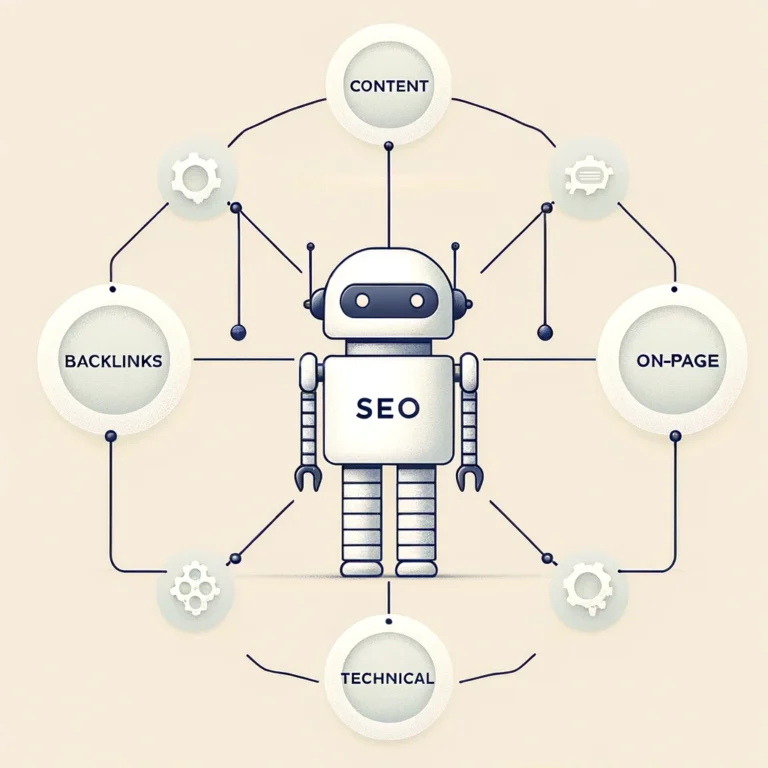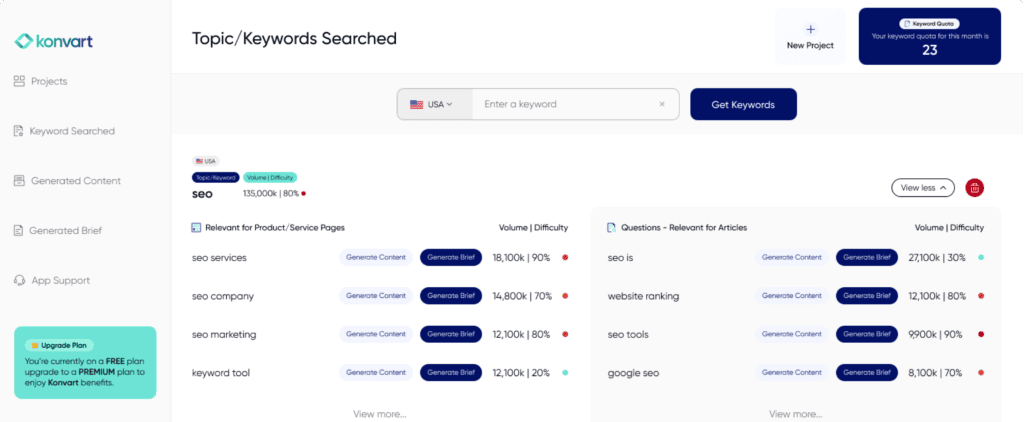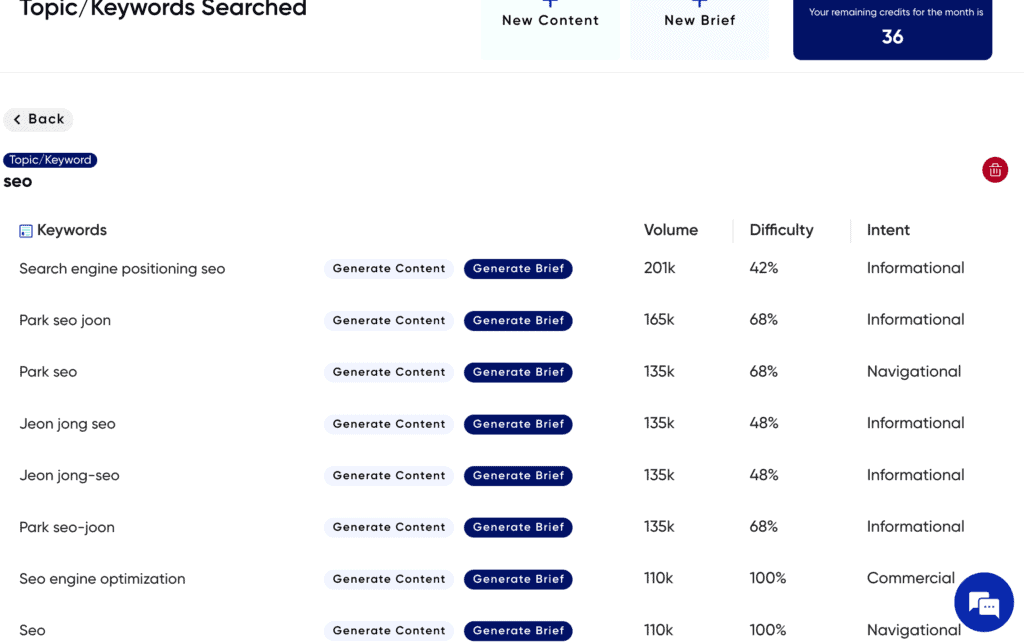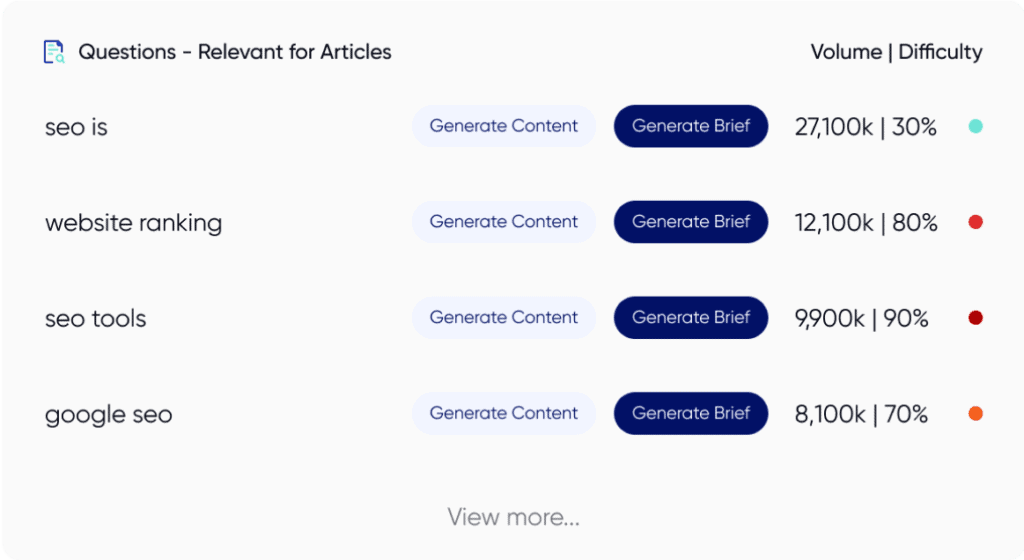SEO automation software streamlines routine tasks such as keyword research, backlink analysis, and content optimization, allowing SEO professionals to focus on more strategic elements of their campaigns.
This article explores various SEO automation tools, including Konvart, and provides a comparative analysis to help you understand their unique features and benefits.
What Tasks Can You Do with SEO Automation Tools?
1. Keyword Research and Analysis
Automated tools significantly expedite the process of keyword research and analysis. They can quickly sift through massive datasets to identify high-value keywords based on criteria such as search volume, competition level, and relevance. This allows SEO specialists to target their efforts better and improve their content’s visibility in search engine results pages (SERPs).
2. SEO Audits
Regular SEO audits are vital for maintaining the health of a website. Automation software can conduct thorough audits that assess a site’s structure, performance, and compliance with SEO best practices. These tools can detect issues like broken links, slow-loading pages, and poorly optimized metadata, which are crucial for maintaining optimal website performance.
3. Link Building
Link building is a critical component of any SEO strategy, but managing it manually is incredibly labor-intensive. SEO automation tools help by identifying potential link-building opportunities, monitoring existing backlinks for health and relevance, and even suggesting the removal of toxic links that could harm your site’s ranking.
4. Content Optimization
Creating content that is both engaging for users and optimized for search engines is a delicate balance. Automation tools assist by analyzing existing content for keyword density, readability, and SEO alignment. They also offer suggestions for improvement, such as adding meta tags, optimizing images, and tweaking article structure to enhance visibility.
5. Rank Tracking
Monitoring the rankings of your keywords provides insights into the effectiveness of your SEO strategies. Automation tools track changes in keyword rankings across different search engines and geographical locations, offering detailed reports that help refine SEO tactics.
6. Competitor Analysis
Understanding how competitors are performing is crucial for any marketing strategy. Automated SEO tools analyze competitors’ websites to reveal their strengths and weaknesses in terms of keyword usage, content quality, backlink profiles, and more. This information is invaluable for developing strategies to outperform them in SERPs.
7. Reporting and Analytics
Generating detailed reports manually is time-consuming. Automation tools provide comprehensive analytics that measures the success of SEO efforts through metrics such as traffic volumes, bounce rates, conversion rates, and more. These reports are crucial for demonstrating ROI to stakeholders and guiding future SEO initiatives.
You can see more SEO areas that can be automated here.
Best SEO Automation Tools
Selecting the right SEO automation tools can significantly enhance your digital marketing strategy by saving time and improving your site’s visibility and ranking. Here are ten of the best SEO automation tools currently available:
- Konvart: known for its robust SERP analysis and keyword research features, Konvart offers automated content writing and optimization, SERP analysis and brief generation, and remote publishing.
- SEMrush: SEMrush’s automation features allow users to track rankings, oversee changes, and get actionable insights from their SEO data. It also automates link building by providing a full list of opportunities based on the website’s keywords and competitors.
- Yoast SEO: A WordPress plugin, Yoast automates many aspects of on-site SEO like meta tags, sitemaps, and content analysis to ensure your site meets the highest technical SEO standards.
How to Choose the Right SEO Automation Tools
When selecting the appropriate SEO automation tools, several factors must be considered to ensure they align perfectly with your business needs and objectives.
Functionality and Features
Start by assessing the functionality you require from an SEO automation tool. Do you need it for keyword research, link building, content optimization, or perhaps all of the above? Different tools offer varying levels of functionality. For instance, some might excel in providing comprehensive keyword data but lack in technical SEO audits.
Integration Capabilities
The SEO tool should seamlessly integrate with other software you are currently using, such as content management systems (CMS) and Google Analytics. Effective integration enhances workflow efficiency and data accuracy.
Ease of Use
A complex tool might offer extensive features but could become underutilized if it requires a steep learning curve. Opt for solutions that offer a clean, intuitive interface and provide reliable customer support and training resources to help your team make the most of the software.
Scalability
Your chosen SEO automation tool should be able to handle increased data processing demands and more extensive SEO campaigns without compromising performance. Scalability ensures that you won’t need to switch tools frequently as your business expands, saving you time and resources in the long run.
Cost Efficiency
Lastly, evaluate the cost relative to the features provided. While it might be tempting to choose less expensive options, they may not always deliver the best value if critical features are missing or limited. Analyze the pricing structures—some tools offer pay-as-you-go plans, while others might have monthly or annual subscriptions based on usage levels. Consider what fits best with your budget while still meeting all other criteria mentioned.
Automated SEO Tools vs. Managed Organic SEO Services
Automated SEO tools, like Konvart, allow users to streamline repetitive tasks using algorithms and machine learning to quickly process large volumes of data to offer insights and recommendations based on current trends and data analytics. The primary advantage of these tools lies in their efficiency and consistency. They operate 24/7 without human intervention, ensuring that SEO tasks are performed regularly without delay. This can be particularly beneficial for businesses looking to maintain an edge in highly competitive markets.
On the other side of the spectrum are managed organic SEO services. These services are typically provided by experienced SEO professionals or agencies who tailor strategies to a client’s unique business needs. Good managed services involve strategic planning, content creation, and ongoing optimization tailored to specific market dynamics and audience behaviors.
A significant benefit of opting for managed services is the human element involved. SEO experts bring years of experience and intuition that software cannot replicate. They can navigate subtle nuances in search engine algorithms and adapt strategies based on shifting market conditions and Google updates.
However, automated tools can reduce labor costs and improve efficiency over using humans alone. In terms of scalability, larger enterprises might find automated tools more beneficial due to their ability to handle vast amounts of data and multiple domains simultaneously. Small to medium-sized businesses might benefit more from managed services as they can offer more personalized attention and customized strategies that are often necessary in less saturated niches.
Data shows that approximately 73% of small enterprises focus on in-house management of SEO but also use some form of automation tool to enhance their efficiency. This hybrid approach allows businesses to leverage the strengths of both options—expertise from outsourced services when necessary and day-to-day efficiency through automation.
Ultimately, each business must assess its unique situation and decide which solution offers the most value in achieving its digital marketing goals while staying aligned with budgetary constraints and operational capabilities.
Where Do SEO Automation Tools Fail?
SEO automation tools have limitations, and understanding where they fall short can help SEO professionals manage their expectations and supplement these tools with human oversight.
Limited Understanding of Context and Nuance
One of the primary shortcomings of SEO automation tools lies in their inability to grasp human language’s context and subtlety fully. While advancements in AI and machine learning have improved their capability to interpret content, these tools often miss the nuances that can make a difference in how content resonates with users. For instance, automated tools may suggest technically relevant keywords but fail to capture the intent or the tone that the target audience might expect. This can lead to content that ranks well but does not engage or convert visitors effectively.
Inability to Adapt to Algorithm Changes
Search engine algorithms are constantly evolving, with updates that can dramatically shift what it takes to rank well. SEO automation tools may not immediately adapt to these changes, potentially causing a lag in response time that could affect website performance. For example, if Google decides to prioritize user engagement metrics more heavily, it might take some time before automation tools catch up and adjust their strategies accordingly. During this period, relying solely on outdated automated recommendations could lead to suboptimal SEO performance.
Over-reliance on Quantitative Data
While data is a cornerstone of effective SEO strategies, an over-reliance on quantitative metrics from automation tools can lead to missed opportunities for qualitative improvements. These tools excel at providing numerical data like search volumes, rankings, and traffic figures; however, only a few effectively measure qualitative factors such as user satisfaction. Without incorporating these softer metrics into SEO strategies, businesses might optimize for search engines at the expense of actual user engagement and satisfaction.
Generic Recommendations
Many SEO automation tools provide generic recommendations that are not tailored to specific business needs or goals. This one-size-fits-all approach can be less effective than customized strategies developed with professional insight. For instance, a tool might recommend certain common keywords without considering a company’s unique value proposition or competitive landscape. This can result in SEO activities that drive traffic but not necessarily the right kind of traffic that leads to conversions.
Ethical Considerations and Spam Risks
Automated SEO software can sometimes border on practices that are either unethical or perceived negatively by search engines. For example, some automation tools facilitate the creation of backlinks in ways that violate search engine guidelines. Use of such tactics can risk penalties from search engines, which could severely impact online visibility and credibility.
What Are the Benefits of Using SEO Automation Tools?
Using SEO automation tools offers several distinct advantages that can significantly enhance the effectiveness and efficiency of SEO strategies. Here are the key benefits:
- Time Savings: One of the most significant benefits of employing SEO automation tools is the substantial amount of time they save.
- Accuracy and Consistency: Automation tools minimize human errors by providing consistent results in tasks like reporting and data analysis.
- Scalability: As businesses grow, managing SEO efforts manually becomes increasingly impractical. Automation tools enable companies to scale their SEO activities efficiently without a corresponding increase in manual labor or resources.
- Competitive Analysis: These tools help in continuously monitoring competitors’ strategies, providing insights into their search rankings, keyword utilization, and content distribution tactics. This ongoing analysis allows businesses to adapt quickly and maintain a competitive edge in their industry.
- Enhanced Reporting: Automation tools streamline the process of gathering and analyzing large volumes of data, enabling more sophisticated reporting. With these tools, SEO professionals can quickly generate detailed reports that highlight campaign performance, trends, and areas for improvement.
- Improved ROI: By automating repetitive tasks and improving the accuracy of SEO activities, helping businesses achieve a better return on investment. They ensure that SEO efforts are not only more effective but also more cost-efficient over time.
Exciting Features to Watch for In SEO Automation Tools
As SEO evolves, automation is set to play a crucial role. With AI and machine learning, SEO tools are becoming more sophisticated, analyzing data faster and predicting trends accurately.
Key trends include AI integration with voice search optimization. As voice search grows, tools will need to understand natural language and user intent better. Predictive analytics is another exciting area, allowing tools to forecast algorithm changes and adapt strategies proactively. This means moving from keyword-centric to context-driven SEO.
Automation will also enhance personalization, creating targeted content strategies that boost user engagement and conversions.
The future of SEO lies in automation technologies like those from Konvart. These tools streamline processes and offer insights beyond traditional methods. For SEO professionals, embracing these innovations is key to staying competitive.
Explore how Konvart can transform your SEO strategies. Sign up or contact us today to embrace the future of SEO.

















